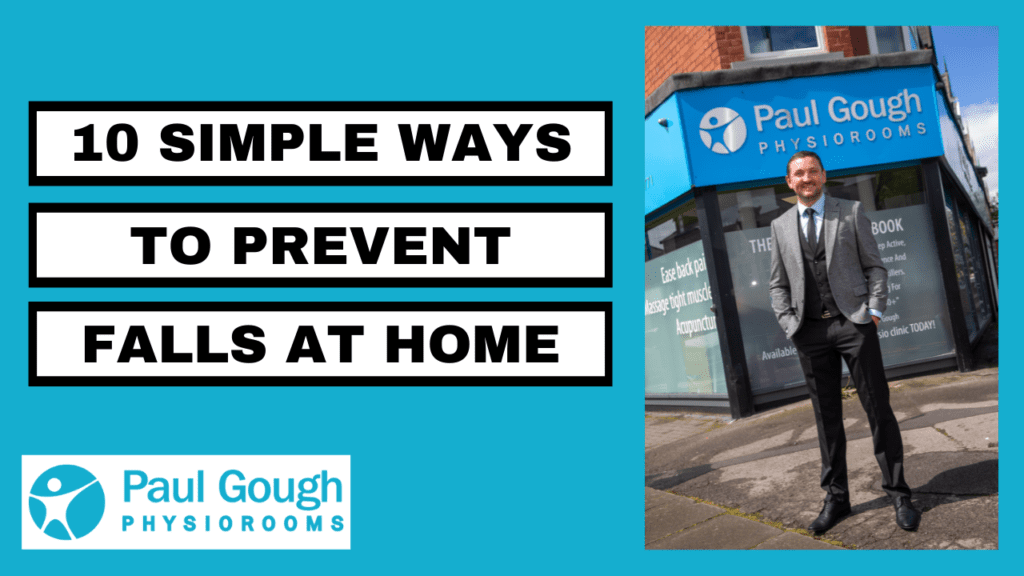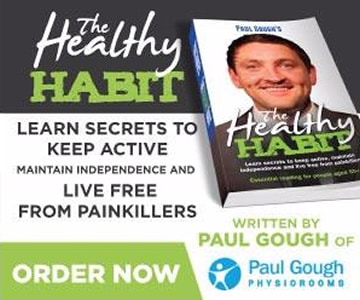
Do you want to prevent falls at home, and have you noticed that you aren’t as stable on your feet as you once were?
Is this leaving you worried about the risk of injuring yourself after a fall at home?
You aren’t alone!
In our clinics, we treat lots of patients who have retired, and falling at home is a real concern for them – If they haven’t fell in the past themselves, they almost certainly have a partner, friend or relative who has.
In the UK, 1 in 3 people over 65 will fall at least once a year…
And that statistics rises to every 1 in 2 for people over 80 so falls are extremely common.
Whilst falls at home don’t always cause an injury, they certainly can wreck your confidence, and spark concerns about losing your independence in the near future.
If you don’t feel confident on your feet, this can lead to you avoiding certain activities, becoming isolated, and because you are moving less, you are likely to lose more strength, balance and coordination which creates a vicious cycle.
To help you regain your confidence and prevent falls at home, our expert physio team have helped put together this blog post for you!
What’s The Common Reasons For Falls At Home?
Whilst falls aren’t exclusive to the elderly, older people are more likely to have a fall because they may have:
- Muscle weakness
- Balance problems
- Loss of vision
- A long-term health condition which can lead to dizziness and a brief loss of consciousness (such as heart disease, low blood pressure or dementia)
- Arthritis in their feet, specifically their big toe (which is crucial for balance)
Watch the videos below where Ell explains three common reasons why the risk of falls at home is higher for the elderly.
[rve src=”” ratio=”16by9″]
A fall is also more likely to happen if:
- Floors are wet or recently polished
- There is poor lighting in the room
- Rugs or carpets are loose, and not properly secured
- You reach above head height (such as getting something from a cupboard)
- You are walking down stairs
- You are rushing (when answering the door, or going to the toilet)
- You have been drinking alcohol (which affects coordination and can exaggerate the effects of some medicines)
10 Simply Ways To Prevent Falls At Home
There are some easy, and practical things that you can do to prevent falls at home, such as:
- Using non-slip mats in the bathroom
- Clean up spillages to prevent wet, slippery floors
- Make sure all rooms, passages and staircases are well lit
- Remove clutter, trailing wires and loose rugs or carpets
- Don’t lift or move heavy or cumbersome items alone
- Don’t wear loose fitting clothes that you could trip you up
- Wear shoes and slippers that are in good condition, have good grip and support your ankle
- Organise your home so you minimise the need to stretch, bend or reach for items (for example – avoid putting heavier items above head height or below hip height)
- Install grab bars on both sides of toilets, bathtubs, shower, staircases and wherever else you need them
And to tell us about the 10th tip is Mel, who joined our team at the end of 2021, and has previously worked a lot with people over 50 in a previous therapist role at Rockcliffe Hall.

“Our 10th tip to prevent falls would be to fix any injuries or problems that would affect your coordination, and work on your strength and balance.
If you have any problems with your feet, ankles, knees, hips, or lower back, you are likely to suffer with poor balance, and this could increase your risk of a fall.
We have worked with lots of patients, some in their 90s, so they can feel more confident on their feet, and be able to stay independent.
A lot of patients who visit us want to stop their aches and pains, but sometimes a bigger reason is so they can keep taking care of themselves without having to rely on their family, and so they can stay in their own home.”
If you are worried about your balance, and want to prevent falls at home, here are some ideas that will help you improve your strength and coordination.
Keep Active
Firstly, everyday activities will enable you to maintain a certain level of balance and coordination, so it is important to do your best to remain active.
Even if you are struggling with your health, general activities like housework and walking can help. For those who are more physically able, consider taking up pilates, yoga or Tai Chi as a fun way to stay active and build confidence.
There are also specific exercises which you can do at home, which will enable you to improve your balance, strength and coordination which will prevent falls at home.
Watch the video below where Mel demonstrates 3 exercises that you can do at home, which will improve your balance and coordination, and reduce your risk of falls at home.
[rve src=”” ratio=”16by9″]
The exercises Mel demonstrates are:
- Standing on one leg
- Single leg squat
Both of these exercises could be progressed through these 3 stages:
- Holding onto a wall, or steady surface
- No support
- No support and your eyes closed
And finally, throwing and catching a ball is another easy to do, but very effective way to improve your hand eye coordination which will improve your stability when you are walking, or moving around the house.
Other Natural, Drug-Free Ways to Prevent Falls At Home
As well as keeping active and performing exercises, there are some other popular solutions to help you prevent falls at home.
Orthotics
In our clinics, we offer custom-made Orthotic inserts which reduce pain, as well as improving your balance and stability.
These inserts fit inside your shoes, and support the muscles, tendons and bones in your feet, and lower legs.
Read a couple of 5-star Google Reviews from patients who have benefitted from Orthotics.
Dawn Tweddle: “I had various pains due to the arch in my foot; calf, knee, thigh and back.
I was recommended a special formed insole, and after using this combined with a few months of massage my body if now balanced.
A claw toe from gripping to correct the problem is now straight, and I expect my old age to be a lot less painful now.
Paul Wren: “The aftercare support from having orthotics fitted has been excellent!
After having to contend with a serious health issue, the staff have given me super support so I can start to get myself fit again and utilise the benefits of the orthotics fully.”
To find out more about whether Orthotics would be suitable for you, contact our friendly team on 01429 866 771.
Free Taster Consultation
If you realise that you are struggling to get around the house, you are losing your balance more often, and your scared about injuring yourself after a fall at home, our expert team are here to help.
We understand that it is harder to get around once you reach retirement age, and our physios have worked with hundreds of patients just like you!
We have helped patients regain their confidence, become more active, and improved their balance and stability so they don’t have to rely on walking sticks.
Our team have a wealth of knowledge to share with you and can create tailor-made treatment plans which deal with your specific injuries or conditions, and help you get you more active, pain-free and reduce the risk of falls at home.
If you aren’t sure whether Paul Gough Physio Rooms is right for you, we offer FREE taster consultations where you can speak to a member of our physio team.
In the consultation, we can discuss your specific problem, and we can give you some simple, jargon-free, personalised advice.
Arrange Your FREE Taster Consultation
Or if you want to read more of our informative blogs, click the link below:
Click Here To Read More Of Our Physiotherapy Blog Articles
Read Our Blog – Most Common Shoulder Problems And How To Fix It
Read Our Blog – How To Stay Independent In Retirement


